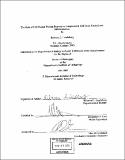The role of E2F·pocket protein repressive complexes in cell cycle control and differentiation
Author(s)
Landsberg, Rebecca L. (Rebecca Lynn), 1975-
DownloadFull printable version (17.77Mb)
Other Contributors
Massachusetts Institute of Technology. Dept. of Biology.
Advisor
Jacqueline A. Lees.
Terms of use
Metadata
Show full item recordAbstract
The pocket protein family is comprised of pRB (the protein product of the retinoblastoma susceptibility gene), p107, and p130. This family regulates the GI/S transition by interacting with their major downstream target, the E2F transcription factor. E2F is a heterodimeric protein composed of one DP subunit and one E2F subunit. The E2F family can be subdivided into three categories based upon structural and functional homology: E2F6; the 'activating E2Fs' (1-3); and 'the repressive E2Fs' (4-5). The focus of this study is E2F4 and E2F5, the members of the repressive E2F subgroup. The repressive E2Fs function by occupying E2F responsive promoters during Go and recruiting in the pocket proteins. As cells begin cycling, E2F4 and E2F5 are replaced at promoters by members of the activating E2Fs subgroup. Loss of either E2F4 or E2F5 does not result in cell cycle defects but instead lead to the abnormal development of specific tissues. The lack of a cell cycle phenotype in single mutants could be due to compensation by the other repressive E2F. In order to determine the role that E2F4·pocket protein repressive complexes play in regulating cell cycle control, differentiation, and development, mice lacking E2F4 and two members of the pocket protein family, p107 and p130, were generated. Analysis of mouse embryonic fibroblasts derived from mutant embryos revealed that while loss of E2F4 alone did not lead to defects in cell cycle control, it did significantly enhance the ability of cells to differentiate into adipocytes. This phenotype could be further enhanced by additional loss of p107 and p130. Analysis of mice lacking E2F4, p107, and p130 revealed a requirement for these proteins in regulating fetal hematpoiesis. Taken together, these data suggest that E2F·pocket protein repressive complexes are critical regulators of differentiation and development.
Description
Thesis (Ph. D.)--Massachusetts Institute of Technology, Dept. of Biology, 2003. Includes bibliographical references.
Date issued
2003Department
Massachusetts Institute of Technology. Department of BiologyPublisher
Massachusetts Institute of Technology
Keywords
Biology.